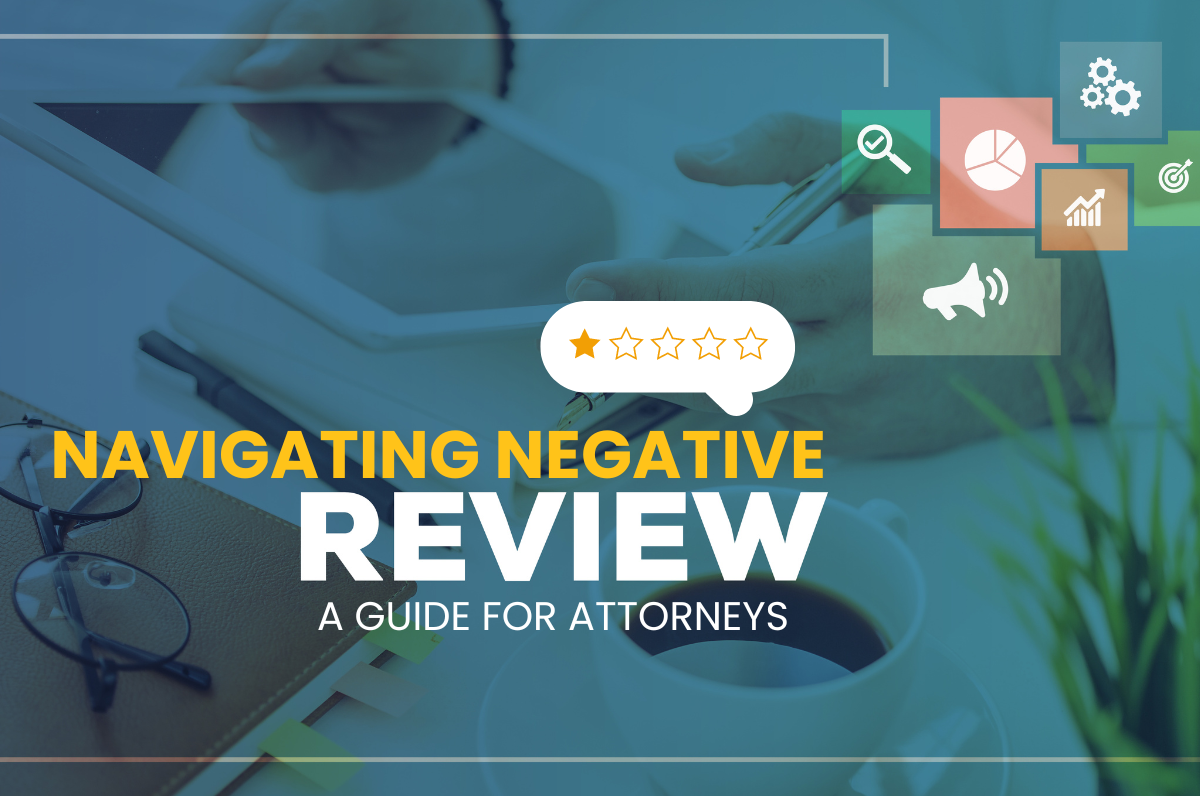
Navigating Negative Reviews: A Guide for Attorneys
In today’s digital age, online reviews wield significant power, shaping public perception and influencing consumer decisions. Attorneys, whether practicing independently or within a firm, are not immune to the impact of negative reviews. These critiques, when left unaddressed, can tarnish reputations and deter potential clients. However, with the right approach, attorneys can effectively manage negative feedback and safeguard their professional image.
Understanding the Root Causes
Negative reviews often stem from various underlying issues, including:
Lack of Transparency
Clients may feel frustrated or dissatisfied when they perceive a lack of transparency in the legal process or the services provided. Clear and open communication is essential in mitigating misunderstandings.
Responsiveness
Timely responsiveness to client inquiries is crucial. Failure to promptly address concerns or return calls and emails can result in negative reviews citing perceived negligence.
Billing Practices
Unclear or ambiguous billing statements can breed mistrust. Providing detailed breakdowns of services rendered can enhance transparency and alleviate billing-related concerns.
Managing Expectations
Setting realistic expectations about the legal process and outcomes is vital. Clients who feel misled or uninformed are more likely to leave negative feedback.
Conservative Advice
While cautious legal counsel is prudent, excessively conservative advice may not align with clients’ objectives. Offering a range of options can better serve clients’ needs and expectations.
Avoiding Common Pitfalls
Legal Action Against Reviewers
Initiating legal proceedings against reviewers, even in cases of defamation, often leads to negative publicity and further escalation of the situation.
Pursuing Review Sites
Attempting legal action against review platforms is typically futile and may worsen the attorney’s online reputation.
Demanding Removal of Reviews
Requesting the removal of negative reviews seldom yields positive outcomes and may exacerbate tensions.
Ignoring Feedback
Failing to address recurring themes in negative reviews hinders opportunities for operational improvement and client satisfaction.
Public Criticism
Publicly disparaging reviewers reflects poorly on the attorney and can amplify reputational damage.
Fake Reviews
Engaging in fraudulent review practices violates ethical standards and can irreparably harm credibility.
Effective Strategies for Resolution
Legal Consultation
Seeking guidance from defamation lawyers can help navigate reviews containing false or defamatory statements.
Reporting Violations
Reviews that violate terms of service or are unrelated to the attorney’s services can often be reported for removal.
Encouraging Positive Feedback
Actively soliciting satisfied clients to share their positive experiences can help counterbalance negative reviews.
In conclusion, while negative reviews pose challenges for attorneys, proactive management and strategic interventions can effectively mitigate their impact. By prioritizing transparency, responsiveness, and client satisfaction, attorneys can uphold their reputations and thrive in an increasingly competitive market.
Introducing Build Brand Better
When faced with the challenge of negative reviews, Build Brand Better offers tailored solutions to safeguard attorneys’ online reputations. As a trusted leader in online reputation management, we specialize in enhancing visibility and mitigating the impact of adverse feedback. Our comprehensive strategies focus on cultivating a positive online narrative for legal professionals.
Proactive reputation management is paramount in today’s digital landscape. Contact Build Brand Better today to learn how we can elevate your online presence and protect your professional reputation. Let us be your ally in shaping a positive image for your legal practice.
FAQ
Q: How do negative reviews affect attorneys’ practices?
A: Negative reviews can significantly impact an attorney’s ability to attract and retain clients. They can tarnish the attorney’s reputation, erode trust, and deter potential clients from seeking their services.
Q: What are some common reasons clients leave negative reviews for attorneys?
A: Clients may leave negative reviews due to various factors such as perceived lack of transparency in the legal process, unresponsiveness from the attorney, unclear billing practices, mismatched expectations, and overly conservative advice.
Q: Is it advisable for attorneys to sue reviewers or review sites over negative feedback?
A: No, pursuing legal action against reviewers or review platforms is generally not recommended. It can backfire, attract more negative attention, and worsen the situation. It’s often more beneficial to focus on addressing the root issues and improving client satisfaction.
Q: Can negative reviews be removed or deleted?
A: While defamatory or off-topic reviews may be eligible for removal, demanding the deletion of negative reviews as a blanket approach is not usually effective. It’s better to focus on responding thoughtfully to reviews and addressing any valid concerns raised by clients.
Q: How can attorneys effectively manage negative reviews?
A: Attorneys can employ various strategies such as seeking legal consultation for defamatory reviews, reporting violations of terms of service, encouraging satisfied clients to leave positive feedback, and partnering with reputable online reputation management firms like Build Brand Better.
For more Blogs:- www.buildbrandbetter.io/blog/
